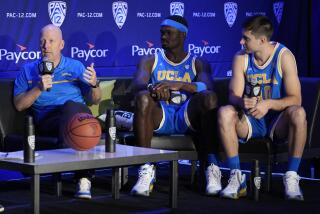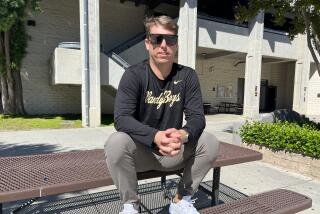McQuarn Is Positively Happy After Leaving Coaching Behind
- Share via
When George McQuarn was the basketball coach at Cal State Fullerton, he had a trademark line, no matter if the decision at hand involved disciplining a player, attacking a defense or picking a hotel.
“I can’t tell you what I’m gonna do,” McQuarn would say to his assistants, “but I can tell you what I’m not gonna do.”
McQuarn was sitting in a meeting with University President Jewel Plummer Cobb and most of the Fullerton head coaches Nov. 2, when it came to him, clear as spring water, what he was not going to do next.
He was not going to coach at Fullerton even one more day.
When he arrived for work the next day, McQuarn wasn’t even wearing court shoes. Unlike the time in 1986 when he announced his resignation effective the end of the season and then retracted a month later, there was to be no turning back. He cleaned out his office the morning of Nov. 3, broke the news to his assistants, his athletic director and his team, and left the campus, he says now, a happy man.
And he did it the way he always told his friends he would--without a word.
He instructed associates to cite only “personal reasons,” refused all interviews, and turned on his answering machine at his unlisted home number to screen his calls.
Now, three months later, McQuarn is working for Athena Builders, the Carson contracting company he owns with longtime girlfriend Juritta Brown, whom McQuarn said last week he would marry in Las Vegas Saturday. And last week he agreed to talk.
“I’m doing well,” McQuarn said. “I’m just fine, happy as I can be. . . . Fullerton is behind me. Coaching is something that’s in my past.”
Once known for his drill-sergeant intensity and as the architect of the Titans’ “we play hard,” noses-to-their-sternums defense, McQuarn now spends his days traveling from site to site, overseeing construction work, trying to get the carpenter to give 110%.
“I’m managing, but sort of coaching,” McQuarn said. “I’m serious. I go out on the job site and make sure things are getting done right. There’s a guy who comes out to inspect--he’s like an official. He gets nasty with me and I get nasty with him. Only thing is, he can’t give me a technical.”
Although his decisive moment came suddenly during the meeting with Cobb, McQuarn says now--and others back his statement--that he told assistants John Sneed and Donny Daniels before the season that this would be his last.
His passion for coaching, an intensity that had led people to call him drill sergeant, father figure and supreme motivator in the same breath, was gone, McQuarn said. Brown, his girlfriend, had been urging him to go into business with her.
Furthermore, his situation at Fullerton had changed.
Last June, at Cobb’s urging, all coaches were required to sign a memo linking renewal of their contracts with specific numerical requirements for fund raising and athletes’ academic success.
Those were issues that found McQuarn lacking. He had been criticized for having a disdain for fund raising, and for the fact that only three players he brought to Fullerton in eight years had earned degrees.
And those issues were the topic of Cobb’s meeting the night before McQuarn resigned. McQuarn listened, and he remembers now what he thought: “This may be really tough.”
At that meeting, McQuarn saw the end of a coaching career that had its beginnings while he was still a student at UCLA, pressing roommate Walt Hazzard for details of John Wooden’s practices.
McQuarn, 47, coached for 16 seasons, going 123-8 in four years at Verbum Dei High School, and working as an assistant to Jerry Tarkanian at Nevada Las Vegas for four more. He was 122-117 in eight seasons at Fullerton, and twice took the Titans to the National Invitation Tournament.
Coaching had been good to him, but here was where the road ended.
“Maybe the party’s over, and it’s time to go home,” McQuarn said he thought that night.
“See, I don’t have a problem with that. Go home on your own terms. Don’t wait till 2 o’clock when they say the party’s over. Leave at about 11.”
McQuarn was home by midnight, pride intact.
“I decided at that meeting,” McQuarn said. “I thought about it on the freeway. I went to bed, and I woke up and I still felt the same way.”
Asked whether Cobb had insulted him at the meeting, which was the perception of some present, McQuarn hesitated.
“No, no, I don’t think so,” he said. “I never felt that Cobb insulted me. It never reached a personal thing between Cobb and I.”
And although there are indications that McQuarn might have faced pressure from the administration after the season, no such pressure was being exerted one month before the season opener.
But the meeting was the catalyst, McQuarn said. It was the trigger that kept him from sticking out the season as he had planned, the event that ended his hope that he could go out a winner, instead of a coach who finished his last season with a 12-17 record.
“I just thought the meeting was a revelation to me that it was time for me to just simply move on,” McQuarn said. “That meeting and the tone of that meeting and the philosophy of that meeting and what I thought I was hearing was just telling me that at this point in my life, maybe I should just move on now. No reason for me to remain at the university for the next four or five months or whatever that may be.”
And although McQuarn said firmly that he planned to leave coaching anyway, that meeting hastened the decision.
“Speeded it up,” McQuarn said, laughing. “Speeded it up.
“I had felt that I needed some time to identify what I wanted to do,” he said. “I certainly felt an obligation to the university and to the players whom I had recruited. But some things happened totally unexpected to me, and I don’t mean the bottom line, that meeting with Cobb. . . As late as last spring I said OK, I’ll come back and coach one more year. I didn’t want to leave on a losing season. I don’t know if there was a single answer. There were a lot of things.”
McQuarn, a coach who has said that he “built the (Fullerton) program on marginal athletes and marginal students,” said he was prepared to respond to the graduation-rate problem.
“They come up with the new policy in academics, so the rules sort of switched on me in midstream,” McQuarn said. “My thinking was if they wanted to do these things in regard to graduation, maybe I needed to start recruiting a different kind of a kid. . . . I was prepared to do that. . . . It bothered me that the kids didn’t graduate; it did.”
Fund raising was more of an issue.
“My feeling on fund raising is that . . . it’s a social function more than anything else,” McQuarn said. “It’s something that’s necessary at Fullerton, no question about it. . . . If you’re asked to speak, you do that. If you’re asked to meet someone for lunch, you do that. I don’t have a problem with any of those things. But when you start asking a coach to raise a specific amount of money, that’s just one more thing you’re expected to achieve as a coach. You’re expected to win basketball games. People are going to look at your wins and losses. Then you’re talking about certain responsibilities with academics. Then you put those things in (a contract agreement).
“I think that probably if everything had stayed the same at the university, I might have stayed a little bit longer. But the expectations of the university with regards to fund raising and academics in my particular situation just made it that much more difficult for me to be successful at the university.”
All that is behind him now, McQuarn said.
“Now I’ve got to move on with my life,” he said. “I have not missed any of it. I don’t miss coaching. That’s truly behind me.
“It’s kind of easy to sit down and watch a ballgame and look at things on the sidelines. You watch a coach draw up the X’s and O’s and see the team go out and do the opposite. Then you listen to the media say, ‘Why didn’t you run a play?’ ”
His interest in the Fullerton team has not flagged so dramatically. Daniels, the assistant coach, called McQuarn the night Fullerton upset Utah in its opener. Sneed has taken game films to McQuarn’s house in Long Beach.
And McQuarn very nearly showed up for the Nevada Las Vegas game at the 18,000-seat Thomas & Mack Center, but canceled because of business commitments. He may yet go to a game.
“I might,” he said. “I don’t think I’ll walk into Titan Gym, though.”
Meanwhile, other coaches are seeking the job McQuarn abandoned. Sneed, who was named acting coach for the season, is a candidate.
“If I were going in as the new head coach at Cal State Fullerton, I think that my attitude would be, ‘Yes, I can make all those things happen. I can win, I can graduate players and I can fund raise.’ And I think that’s the way that guy should think,” McQuarn said.
Despite his own experience, McQuarn hasn’t sought to dissuade Sneed, who worked with him at Fullerton for eight years.
“When you’re a coach, you love coaching,” McQuarn said. “John’s a coach. That’s his passion. That’s something a person has to go through, has to experience for themselves.”
Whether McQuarn ever will coach again is uncertain. Clearly it would be difficult for him to get a job after leaving Fullerton as he did.
“Right now, I don’t see myself returning to coaching at this moment in my life,” McQuarn said. “I made a commitment to what I’m doing right now. For me to say there’s a chance for me to coach, there’s something wrong with that. See what I’m saying? Right now, I don’t see myself coaching--right now, next year or two years down the road. If I do return to coaching, it means the other things didn’t work out,” he said, laughing. “Then I go back to what I know how to do.”
More to Read
Go beyond the scoreboard
Get the latest on L.A.'s teams in the daily Sports Report newsletter.
You may occasionally receive promotional content from the Los Angeles Times.










